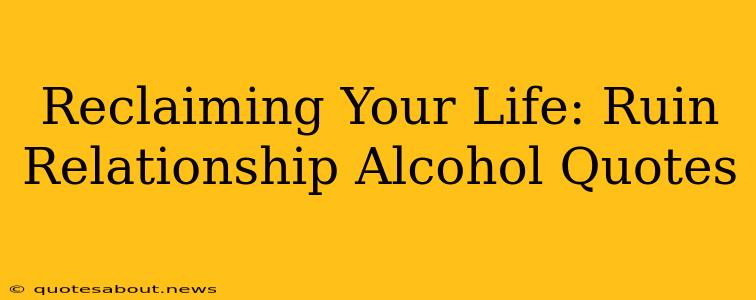Reclaiming Your Life: Healing from a Relationship Ruined by Alcohol
Alcohol abuse can irrevocably damage relationships, leaving a trail of heartbreak and regret. If you're grappling with the aftermath of a relationship shattered by alcohol, know that you're not alone and healing is possible. This journey requires courage, self-compassion, and a commitment to rebuilding your life. This post explores the impact of alcohol on relationships, provides coping strategies, and offers guidance on reclaiming your well-being.
Understanding the Devastation: How Alcohol Ruins Relationships
Alcohol's impact on relationships is multifaceted and devastating. It can manifest in several ways:
- Increased Conflict: Alcohol lowers inhibitions, leading to arguments, verbal abuse, and even physical violence. The blurred judgment impairs communication, making healthy conflict resolution nearly impossible.
- Broken Trust: Promises broken during intoxication, infidelity fueled by alcohol, and secretive drinking behaviors erode the foundation of trust in a relationship. Rebuilding trust after such breaches is extremely challenging.
- Emotional Neglect: The preoccupation with alcohol often leads to emotional neglect, leaving partners feeling unseen, unheard, and unloved. This can create deep feelings of loneliness and resentment.
- Financial Instability: Alcohol addiction is often costly, impacting financial stability and creating further stress within the relationship.
- Loss of Identity: Partners may lose their sense of self as they become enmeshed in managing the alcoholic's behavior and the resulting chaos.
Addressing the Emotional Toll: Healing from the Pain
The emotional fallout from a relationship ruined by alcohol can be profound. It's crucial to acknowledge and address the pain to begin the healing process:
- Allow Yourself to Grieve: The end of a relationship, especially one marked by alcohol abuse, requires mourning the loss. This includes acknowledging the hurt, anger, sadness, and confusion you feel.
- Seek Support: Talking to trusted friends, family members, or a therapist can provide crucial emotional support and guidance. Support groups, such as Al-Anon (for friends and family of alcoholics), can be incredibly beneficial.
- Practice Self-Care: Prioritize your physical and emotional well-being through activities like exercise, healthy eating, mindfulness, and engaging in hobbies you enjoy.
- Establish Boundaries: Setting healthy boundaries is vital for protecting yourself from further harm and establishing a sense of control in your life. This includes distancing yourself from toxic influences and prioritizing your well-being.
Frequently Asked Questions (FAQs)
Here are some common questions people ask about recovering from a relationship damaged by alcohol:
Q: How do I know if my partner's drinking is a problem?
A: Excessive drinking, repeated attempts to cut back, neglecting responsibilities due to drinking, withdrawal symptoms when not drinking, and negative consequences (job loss, relationship problems) are all signs of a potential problem. If you are concerned, encourage your partner to seek professional help.
Q: Is it possible to save a relationship affected by alcohol abuse?
A: Saving a relationship affected by alcohol abuse is possible, but only if the alcoholic is willing to seek professional help and commit to sobriety. It often requires both partners to engage in therapy and actively work towards healing and rebuilding trust.
Q: How can I help someone I love who is struggling with alcohol abuse?
A: You cannot force someone to get help, but you can encourage them to seek professional assistance. Offer your support, but also set boundaries to protect your own well-being. Learning about alcoholism and recovery can help you better understand their struggles and provide more effective support.
Q: What if I still feel anger or resentment towards my former partner?
A: It's normal to feel anger and resentment after experiencing a relationship damaged by alcohol. Addressing these feelings through therapy, journaling, or other healthy coping mechanisms is essential for moving forward. Forgiving doesn't mean condoning their behavior but rather releasing the anger to heal yourself.
Reclaiming Your Future: Building a Stronger You
Healing from a relationship marred by alcohol is a journey, not a destination. It takes time, patience, and self-compassion. By focusing on your own well-being, establishing healthy boundaries, and seeking support, you can reclaim your life and build a brighter future. Remember, you deserve happiness and a healthy, fulfilling life.

